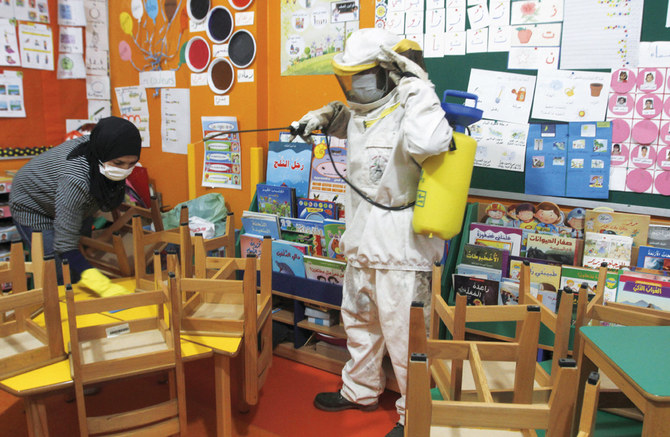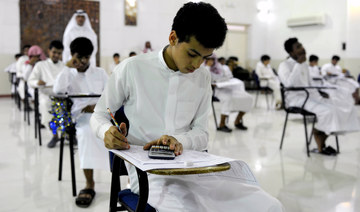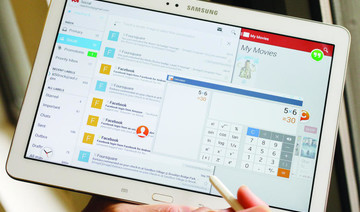DUBAI: In an attempt to minimize the risk of the spread of the new coronavirus, which has infected more than 160,000 people in at least 150 countries, many educational institutions are advising students to stop attending classes, closing campuses and canceling fields trips and after-school events.
The spread and treatment of the highly infectious COVID-19 respiratory disease has become an accelerating health, economic and governance concern worldwide.
At a community level, concerns about the virus have disrupted education systems in more than 30 nations during the second half of the academic calendar. Safety precautions being taken by countries in the Arab region and beyond will keep children at home for a month if not longer.
In the UAE, where more than 80 coronavirus cases have been reported so far, the Ministry of Education ordered the closure of all schools and universities for a period of four weeks starting from March 8.
Soon afterwards, Saudi Arabia’s education ministry announced the closure of all educational institutions, including public and private schools as well as technical and vocational training institutes.
Many institutions in the Kingdom intend to ensure uninterrupted education through digital learning methods in tandem with other measures to reduce the spread of the virus through movement and public interaction.
School closures have also been reported in Lebanon, Kuwait, Bahrain, Japan, Hong Kong, Italy, the UK, and Iran. Many states in the US are also said to be weighing the option along with event cancellations, social distancing and creating employee plans to work remotely.
Opinion
This section contains relevant reference points, placed in (Opinion field)
In the age of high-speed internet and advanced digital technologies, temporary class suspension or school closure does not mean giving students an impromptu vacation. Many of these institutions have quickly adopted and implemented the concept of “distant learning” by utilizing various online educational programs.
The rapid pace of developments has understandably raised doubts about the viability and value of virtual or e-learning.
Atif Mahmood, founder and CEO of Teacherly, a collaborative lesson-planning platform, said distance-education programs could provide students with extended learning projects in all core subjects as well as practical classes that covered the daily school hours.
Teachers could assign lessons to students for independent learning and, at the same time, use available features to enhance and personalize the assignments, he told Arab News.
“One of the unique features includes embedding voice notes and video messages into your lessons, which is useful for teachers who would like to further explain concepts, tasks, ideas or simply maintain a face-to-face connection with students,” Mahmood added.
In addition to providing real-time feedback, online learning platforms enable teachers “to create schedules and check-ins” so that they can monitor the precise time students log into their lessons and the progress they are making.
Through the Teacherly platform, for example, teachers could work on expanding “students’ knowledge development and understanding from a distance” by embedding quizzes within a lesson, the chief executive said.
“Different schools will do this in different ways, but most schools will try and stick to the normal timetable, so students feel it is a school day and experience the feeling of normality and support.”
Mahmood noted that the value of distance learning had been known long before the restrictions linked to the coronavirus outbreak were put in place.
“The only way to embrace this change (technology) is through appreciation of the value of teachers. They must get the training and time to develop the confidence and skills necessary to deliver remote lessons or face-to-face learning, not only from schools but co-working spaces too.”
Mahmood’s optimism was shared by Ibrahim Naji, chief executive officer of RealEDU Academy, a digital workspace.
He told Arab News that the use of technology and e-learning as a “complementary tool,” and possibly as a framework, could result in a much wider choice of learning approaches.
“Technology and virtual tools have democratized the learning curve, allowing different students from different backgrounds of life to learn and develop new skills without necessarily having to sit in front of a whiteboard or read a textbook,” he said.

Ibrahim Naji, chief executive officer of RealEDU Academy, a digital workspace. (Supplied)
Naji pointed out that a study conducted by Pew Research Center, a US-based think tank, found that 51 percent of YouTube users said they relied on the video-streaming platform to figure out how to learn new things.
“Does that mean that YouTube is replacing classrooms or educational institutions? No, of course not. But it opens up the conversation about introducing these platforms, that are so frowned upon, to help us teach our future leaders,” he added.
According to Naji, virtual learning was a “sustainable form of learning as long as it is a controlled environment.”
However, a “one size fits all approach” was not practical for all students, and he recommended diversifying teaching methodologies and aligning them with the demands of the marketplace.
“With the introduction of platforms such as Coursera, RealEDU and Udemy, and tech giants such as LinkedIn launching new virtual-learning platforms, schools have realized that they have to adapt and adopt,” he said.
Noting the trend set by Google and Tesla of ignoring the academic backgrounds of applicants in their hiring process, Naji said more companies were becoming aware that individuals could “develop extraordinary skills through virtual-learning platforms.”
He added: “Schools from around the world have adopted new online learning programs and technologically advanced tools in order to stay ahead of the curve.”
This could be seen in the successful application of distance learning even to practical classes such as lab work and physical education (PE), Naji said, adding that the use of video and audio as well as interactive apps had encouraged “explorative learning,” which was useful for developing skills in complementary subjects such as PE, art, drama and science-kinesthetic learning.
Virtual tools had also facilitated seamless interaction and engagement between students and online learning, said the RealEDU CEO. “From a science perspective, virtual reality and augmented reality allows you to practically undergo experiments without any hazardous risks.
“From a PE perspective, dynamic cameras have been developed to monitor and track students’ performances while taking part in sports.” Such technologies were not replacing lab or PE classes, “but simply complementing them.”

Similar to schools, universities are going to face a number of challenges as the coronavirus outbreak prompts campus closures and makes professors dependent on e-learning and the use of virtual reality to deliver educational content.
Dubai-based Heriot-Watt University has developed a study contingency plan to make sure that students can continue studying off-campus, with faculties providing remote support.
Ammar Kaka, provost and vice principal of the university, told Arab News that staff and students would continue using the virtual learning environment (VLE) program known as “Vision” — which is accessible on a PC desktop and by phone — every day to receive tasks and post assignments.
“It allows us the ability to deliver live and recorded video content, set quizzes, surveys and assignments, encourage online discussion and track progress and manage grades,” he said.
As for Saudi Arabia, many of its universities already had an advanced integrated online education infrastructure in place. Now authorities are taking measures to expand that system.
Dr. Noura Al-Marri, vice chairperson of the Shoura Council’s educational committee, recently told Arab News: “Integrated and remote education was one of the proposed plans (even) before the spread of the coronavirus.
“The health situation facing the world has pushed the Kingdom to use the learning alternatives and accelerate the e-learning process through its known and accredited platforms.”


















